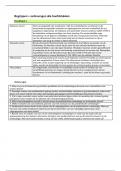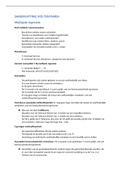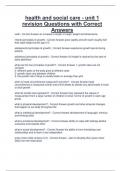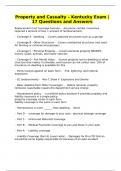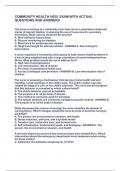E. Boots (680877)
January 17, 2022
Table of contents (for the exam):
- Reading (give definitions for the vocabulary + answer questions about the text);
- Vocabulary (ML unit 4&5 + Communication Across Cultures + Five Dimensions Model + prepositions
+ prefixes & suffixes);
- Grammar (mix tenses present simple, present continuous, past simple, past continuous, present
perfect simple + future simple + past simple vs. present perfect simple + the passive voice);
- Writing (answer questions about working internationally, culture, changes in business etc. + write
an essay about cultural differences).
Lesson 1
Culture is that complex whole which includes knowledge, belief, art, law, morals, custom, and any
other capabilities and habits acquired by man as a member of society.
Culture in a less broadly way: music, dance, art, food or how you dress.
Culture: patterns of behavior that are common within a particular population of people.
Culture is learnt: we are not born with it, we learn it over time.
Culture is shared: we practice it as a group and not as individuals alone.
Culture is symbolic: we use it to give meaning to things and to communicate.
Culture is holistic: it is 360 and all encompassing (alles omvattend) (everything together).
Culture is integrated: it is part of everything: all organizations, all systems etc.
Value: what we believe to be important.
Beliefs: our basis assumptions about the world and the value that come from those beliefs.
Norms: what we consider to be usual, normal or typical.
Typically Dutch culture assumptions:
- direct (saying what we mean);
- don’t like to share.
Vocabulary word Definition
Abrupt Brief to the point of rudeness (sudden, immediate, quick)
Come across To behave in a way that makes people believe you have a particular
characteristic (meet or find by chance)
Effort Physical or mental activity needed to achieve something (or energy used to
do something)
Expectation A belief that something will happen or will be the case.
Harmony Living together peacefully rather tan fighting or arguing (pleasant
combination of music played at the same time)
Inclined Likely or wanting to do something (leaning or a slope)
Interaction When two or more people/things communicate with or react to each
other
Interpersonal Relations between people – how they communicate with others
Meet with resistance The refusal to accept or agree with something
Uncaring Cold, unconcerned
, Traits A distinguishing quality or characteristic, typically one belonging to a
person
Prepositions are words that show the relationship between a noun, pronoun, or some other element
in a sentence.
Reading exercise ‘Communication Across Cultures
Exercise on Prepositions
Lesson 2
In-class Activity (doc.)
Exercise A pg.45 Vocabulary
Appraisal (waardering) Assessment (aanslag/schatting)
Take industrial action Go on strike
Autonomy Empowerment
Bureaucracy Red tape
Burnout Breakdown
A compensation package Remuneration (vergoeding)
Perk Fringe benefits
Golden handshake Severance payment
Word formation
The meaning of a word can be modified throught the addition of an affix: a collection of letters
added to the root of a word to change its meaning.
Prefix: affix added to the front of a word
Suffix: affix added tot the end of a word
A suffix or prefix to make this mean to see an event in the future: SEE
to make this mean possible to see or know beforehand: FORSEE
to make this mean impossible to see or know beforehand: UNFORSEEABLE
The most common prefixes are dis-, in-, mi-, il-, ir-, mis-, non and un- : disinterested, insincere,
impolite, illegal, irrelevant, misinformed, nonfunctioning, and unreliable.
Vowel = klinker
Consonant = medeklinker


